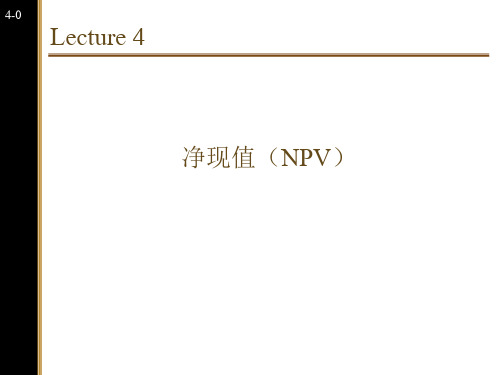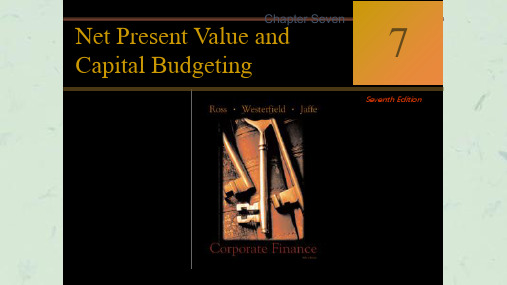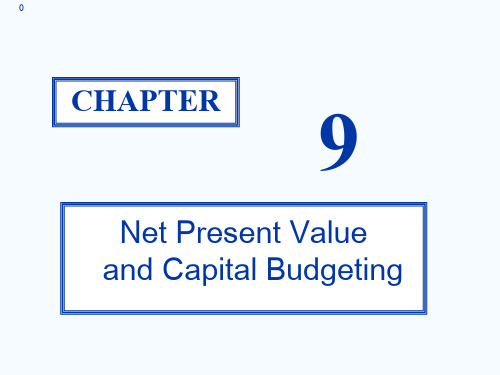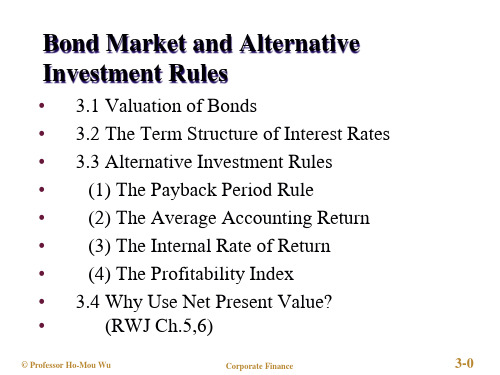公司理财双语npv.ppt
合集下载
公司金融讲义NPV-精品课件

• 以一期的例子为例,终值(FV)的公式可
以写成: FV = C1×(1 + r)
其中 C1 是时间1的现金流,而 r 是一个适当 的利率。
4-3
4.1单期例子: 现值
• 如果你投资于一个项目,一年后付给你 $10,000,且当时的利率为5%。这个项目 现值是$9,523.81。
$9,523.81 $10,000 1.05
PV
$20,000
0
1
2
3
4
5
$9,943.53
$20,000 (1.15)5
4-15
等待时间
今天以10%的利率存款$5,000,什么时候会 变成$10,000?
FV C0 (1 r)T
$10,000 $5,000 (1.10)T
(1.10)T $10,000 2 $5,000
ln(1.10)T ln 2
• 2、Our destiny offers not only the cup of despair, but the chalice of opportunity. (Richard Nixon, American President )命运给予我们的不是失望之酒,而是机会之杯。二〇二一年五月二十六日2021年5月26 日星期三
$500是利息 ($10,000 × .05) $10,000 是本金 ($10,000 × 1) $10,500 是本金和利息的总和。计算公式如下:
$10,500 = $10,000×(1.05)
期末所要交的本金和利息数额叫做将来价值 或者终 值。
Future Value (FV)
4-2
4.1单期例子: 终值
$50,000 $5,000 (1 r)12
以写成: FV = C1×(1 + r)
其中 C1 是时间1的现金流,而 r 是一个适当 的利率。
4-3
4.1单期例子: 现值
• 如果你投资于一个项目,一年后付给你 $10,000,且当时的利率为5%。这个项目 现值是$9,523.81。
$9,523.81 $10,000 1.05
PV
$20,000
0
1
2
3
4
5
$9,943.53
$20,000 (1.15)5
4-15
等待时间
今天以10%的利率存款$5,000,什么时候会 变成$10,000?
FV C0 (1 r)T
$10,000 $5,000 (1.10)T
(1.10)T $10,000 2 $5,000
ln(1.10)T ln 2
• 2、Our destiny offers not only the cup of despair, but the chalice of opportunity. (Richard Nixon, American President )命运给予我们的不是失望之酒,而是机会之杯。二〇二一年五月二十六日2021年5月26 日星期三
$500是利息 ($10,000 × .05) $10,000 是本金 ($10,000 × 1) $10,500 是本金和利息的总和。计算公式如下:
$10,500 = $10,000×(1.05)
期末所要交的本金和利息数额叫做将来价值 或者终 值。
Future Value (FV)
4-2
4.1单期例子: 终值
$50,000 $5,000 (1 r)12
净现值NPV的计算PPT课件

相同金额的存款。第1次存款是在1年以后。
2020/3/3
公司理财讲义
27
两笔年金的现值相等
计算过程分三步:前两步要计算最后4年要支付学费的现值,然后再计 算南希夫妇每年要存多少款,其现值才等于所支付学费的现值。 (1) 用年金公式计算4年学费的现值:
(2) 计算4年学费在第0期的现值: (3) 使存款与支付学费的现值相等:
公司理财讲义
33
本章小结
两个基本概念:现值与终值 利率一般是按照年计息的。 投资决策的基本方法是净现值法:
NPV
C0
C (1 r)
(1
C r)2
(1
C r
)
N
C0
N t 1
C (1 r)t
2020/3/3
34
公司理财讲义
本章小结
四个简化公式
永续年金 : PV C
不定期年金(the infrequent annuity) 指年金的支付频率不确定,超过1年期
使两笔年金的现值相等
2020/3/3
公司理财讲义
23
递延年金实例
丹尼尔·卡拉维洛( Danielle Caravello)在六年后 开始的四年之内,每年会收到500美元。如果利率
为10%,那么他的年金的现值为多少?
e是一个常数其值约为27182020622公司理财讲义10连续复利2020622公司理财讲义1144简化公式simplifications永续年金perpetuity永续年金annuity是一系列没有止境的现金流比如英国政府发行的金边债券consols由英国政府1751年开始发行的长期债券一个购买金边债券的投资者有权永远每年都在英国政府领取利息永续增长年金growingperpetuityastreamcashflowsconstantrateforever
2020/3/3
公司理财讲义
27
两笔年金的现值相等
计算过程分三步:前两步要计算最后4年要支付学费的现值,然后再计 算南希夫妇每年要存多少款,其现值才等于所支付学费的现值。 (1) 用年金公式计算4年学费的现值:
(2) 计算4年学费在第0期的现值: (3) 使存款与支付学费的现值相等:
公司理财讲义
33
本章小结
两个基本概念:现值与终值 利率一般是按照年计息的。 投资决策的基本方法是净现值法:
NPV
C0
C (1 r)
(1
C r)2
(1
C r
)
N
C0
N t 1
C (1 r)t
2020/3/3
34
公司理财讲义
本章小结
四个简化公式
永续年金 : PV C
不定期年金(the infrequent annuity) 指年金的支付频率不确定,超过1年期
使两笔年金的现值相等
2020/3/3
公司理财讲义
23
递延年金实例
丹尼尔·卡拉维洛( Danielle Caravello)在六年后 开始的四年之内,每年会收到500美元。如果利率
为10%,那么他的年金的现值为多少?
e是一个常数其值约为27182020622公司理财讲义10连续复利2020622公司理财讲义1144简化公式simplifications永续年金perpetuity永续年金annuity是一系列没有止境的现金流比如英国政府发行的金边债券consols由英国政府1751年开始发行的长期债券一个购买金边债券的投资者有权永远每年都在英国政府领取利息永续增长年金growingperpetuityastreamcashflowsconstantrateforever
公司理财中英文课件 (8)

贴现率 16% IRR 18% 净现值 9 0 -499
IRR=16.04%
23
3 The Internal Rate of Return Rule: Example 3 Consider the following project:
• 已知某投资项目的有关资料如下表,计算该项目的IRR
年份 现金净流量 0 (20 000) 1 11 800 2 13 240
• • • • • •
NPV=11 800×(P/F ,i,1)+13 240×(P/F,i,2)-20 000=0 采用逐步测试法: 适用18%进行测试:NPV=-499 折现率高了 使用16%进行测试:NPV=9 折现率低了 IRR在16%-18%之间 采用内插法:
16
2 The Profitability Index (PI) Rule: Example 3
• 下列关于净现值和现值指数的说法,正确的是( )。 A.净现值反映投资的效益 B.现值指数反映投资的效率 C.现值指数消除了不同项目间投资额的差异 D.现值指数消除了不同项目间项目期限的差异 • 『正确答案』ABC
10
• 7 The Profitability Index (PI) Rule: Example 1
例:某公司有以下投资机会, 计算PI.
项目 1
C0 -20
C1 70
C2 10
现金流量的现值 盈利指数 (12% ) 70.5 3.53
净现值 50.5
70.5/20=3.53
11
2 The Profitability Index (PI) Rule: Example 2
• 有甲乙两个投资项目,有关资料如下:
投资额 现金流入现值 (现金流出的现值)
IRR=16.04%
23
3 The Internal Rate of Return Rule: Example 3 Consider the following project:
• 已知某投资项目的有关资料如下表,计算该项目的IRR
年份 现金净流量 0 (20 000) 1 11 800 2 13 240
• • • • • •
NPV=11 800×(P/F ,i,1)+13 240×(P/F,i,2)-20 000=0 采用逐步测试法: 适用18%进行测试:NPV=-499 折现率高了 使用16%进行测试:NPV=9 折现率低了 IRR在16%-18%之间 采用内插法:
16
2 The Profitability Index (PI) Rule: Example 3
• 下列关于净现值和现值指数的说法,正确的是( )。 A.净现值反映投资的效益 B.现值指数反映投资的效率 C.现值指数消除了不同项目间投资额的差异 D.现值指数消除了不同项目间项目期限的差异 • 『正确答案』ABC
10
• 7 The Profitability Index (PI) Rule: Example 1
例:某公司有以下投资机会, 计算PI.
项目 1
C0 -20
C1 70
C2 10
现金流量的现值 盈利指数 (12% ) 70.5 3.53
净现值 50.5
70.5/20=3.53
11
2 The Profitability Index (PI) Rule: Example 2
• 有甲乙两个投资项目,有关资料如下:
投资额 现金流入现值 (现金流出的现值)
《公司理财》斯蒂芬A.罗斯..-机械工业出版社-英文课件

Chapter Seven
7 Net Present VCaolrupeoraantedFinance
Capital Budgeting Ross • Westerfield • Jaffe
Seventh Edition
Seventh Edition
《公司理财》斯蒂芬A.罗斯..-机械工业出版社-英文
《公司理财》斯蒂芬A.罗斯..-机械工业出版社-英文
Cash Flows—Not Accounting Earnings.
• Consider depreciation expense. • You never write a check made out to “depreciation”. • Much of the work in evaluating a project lies in taking accounting
《公司理财》斯蒂芬A.罗斯..-机械工业出版社-英文
Incremental Cash Flows
• Side effects matter. • Erosion and cannibalism are both bad things. If our new product causes existing customers to demand less of current products, we need to recognize that.
Cost of bowling ball machine: $100,000 (depreciated according to ACRS 5-year life).
• Later chapters will deal with the impact that the amount of debt that a firm has in its capital structure has on firm value.
7 Net Present VCaolrupeoraantedFinance
Capital Budgeting Ross • Westerfield • Jaffe
Seventh Edition
Seventh Edition
《公司理财》斯蒂芬A.罗斯..-机械工业出版社-英文
《公司理财》斯蒂芬A.罗斯..-机械工业出版社-英文
Cash Flows—Not Accounting Earnings.
• Consider depreciation expense. • You never write a check made out to “depreciation”. • Much of the work in evaluating a project lies in taking accounting
《公司理财》斯蒂芬A.罗斯..-机械工业出版社-英文
Incremental Cash Flows
• Side effects matter. • Erosion and cannibalism are both bad things. If our new product causes existing customers to demand less of current products, we need to recognize that.
Cost of bowling ball machine: $100,000 (depreciated according to ACRS 5-year life).
• Later chapters will deal with the impact that the amount of debt that a firm has in its capital structure has on firm value.
公司理财中英文课件 (9)

如上题:等额年金法分析 B项目的净现值
B项目净现值的等额年金: 希望能使一次性支付7 9 8 . 4 2美元 和一笔四年期的年金相等:
C= 2 8 9 . 2 8 美元
15
1 Mutually Exclusive Investments:Example 1
设备A的重复循环给出了未来无限期的年支付额3 2 1 . 0 5美 元,设备B的重复循环给出了未来无限期的年支付额2 8 9 . 2 8美元。很显然,设备B成本低, 设备B优于设备A。
5
1 Mutually Exclusive Investments: Example 1
设备B具有较高的流出量的现值(成本)。一种天真的办法是选 择设备A,因为它具有较低的流出量。 然而,设备B有较长的使用周期,因而可能实际年均成本更 低。 仅使用NPV则会产生误差。
6
1 Mutually Exclusive Investments
17
2 Replacement Decision
设备更新决策:公司需要决定何时以新的机器设备来替代旧 设备,即继续使用旧设备还是购置新设备的选择。 将新旧设备分别视为两个项目(假设收入相同): 1. 总成本法:如果两个项目周期相同,直接比较现金流(总成 本); 2. 平均年成本法:如果两个项目期限不同,则转化为年均成本:
11
1 Mutually Exclusive Investments:Example1
设备B有三个完整周期。设备B的第二个循环,设备B的重置 发生于第4期。因此,另外6 0 0美元将在此时支付并且要准备 在第5、6、7、8期每期支付1 0 0美元的修理费,第三个循环 在8期在第1 2年完成。设备B 1 2年的总成本的现值为:
23
B项目净现值的等额年金: 希望能使一次性支付7 9 8 . 4 2美元 和一笔四年期的年金相等:
C= 2 8 9 . 2 8 美元
15
1 Mutually Exclusive Investments:Example 1
设备A的重复循环给出了未来无限期的年支付额3 2 1 . 0 5美 元,设备B的重复循环给出了未来无限期的年支付额2 8 9 . 2 8美元。很显然,设备B成本低, 设备B优于设备A。
5
1 Mutually Exclusive Investments: Example 1
设备B具有较高的流出量的现值(成本)。一种天真的办法是选 择设备A,因为它具有较低的流出量。 然而,设备B有较长的使用周期,因而可能实际年均成本更 低。 仅使用NPV则会产生误差。
6
1 Mutually Exclusive Investments
17
2 Replacement Decision
设备更新决策:公司需要决定何时以新的机器设备来替代旧 设备,即继续使用旧设备还是购置新设备的选择。 将新旧设备分别视为两个项目(假设收入相同): 1. 总成本法:如果两个项目周期相同,直接比较现金流(总成 本); 2. 平均年成本法:如果两个项目期限不同,则转化为年均成本:
11
1 Mutually Exclusive Investments:Example1
设备B有三个完整周期。设备B的第二个循环,设备B的重置 发生于第4期。因此,另外6 0 0美元将在此时支付并且要准备 在第5、6、7、8期每期支付1 0 0美元的修理费,第三个循环 在8期在第1 2年完成。设备B 1 2年的总成本的现值为:
23
公司理财课件英文版(ppt 25)

If r=10%, 0.9+1 .325 =2.105=PV(C)>1+1 . 2 =2.091=PV(Y)
1 .1
1 .1
: not feasible
If r=20%, 0.9+1 .325 =2.004=PV(C)>1+1 . 2 =2.000=PV(Y)
1 .2
1 .2
: not feasible
2-6
Use PV to Check Feasibility of Consumption plan
Example 2:
Is the consumption plan C0=0.9m and C1=1.325m feasible? Use the PV formula to evaluate it.
PV= C1F C2F C3F 1r (1r)2 (1r)3
NPV= C0 F 1 C 1 rF (1 C r2)2 F (1 C r3)3 F = CF0 PV
© Professor Ho-Mou Wu
Corporate Finance
2-13
Fisher’s Separation Principle
2-11
Corporate Investment Decision-Making
• In reality, shareholders do not vote on every investment decision faced by a firm and the managers of firms need decision rules to operate by.
公司理财课件英文版(ppt 25)
© Professor Ho-Mou Wu
Corporate Finance
理财知识-公司理财双语npv 精品

We need to ask ourselves the following questions when evaluating capital budgeting decision rules:
Does the decision rule adjust for the time value of money?
Payback
Example
Examine the three projects and note the mistake we would make if we insisted on only taking projects with a payback period of 2 years or less.
The difference between the market value of a project and its cost.
Net Present Value (NPV) = ﹣Initial Investment + Total PV of future CF’s
9-5
NPV – Decision Rule
CFO Decision Tools
Survey Data on CFO Use of Investment Evaluation Techniques
NPV, 75%
IRR, 76%
Payback, 57% Book rate of return, 20% Profitability Index, 12% 0% 10% 20% 30% 40% 50% 60% 70% 80% 90% 100%
expected to add value to the firm and will therefore increase the wealth of the owners. Since our goal is to increase owner wealth, NPV is a direct measure of how well this project will meet our goal.
Does the decision rule adjust for the time value of money?
Payback
Example
Examine the three projects and note the mistake we would make if we insisted on only taking projects with a payback period of 2 years or less.
The difference between the market value of a project and its cost.
Net Present Value (NPV) = ﹣Initial Investment + Total PV of future CF’s
9-5
NPV – Decision Rule
CFO Decision Tools
Survey Data on CFO Use of Investment Evaluation Techniques
NPV, 75%
IRR, 76%
Payback, 57% Book rate of return, 20% Profitability Index, 12% 0% 10% 20% 30% 40% 50% 60% 70% 80% 90% 100%
expected to add value to the firm and will therefore increase the wealth of the owners. Since our goal is to increase owner wealth, NPV is a direct measure of how well this project will meet our goal.
公司理财培训资料英文版(ppt 27)

i1
i2? i3? i4?
1 year zero: Price = 926 2 year zero: Price = 842 3 year zero: Price = 758 4 year zero: Price = 683
1 year bond 2 year bond 3 year bond 4 year bond
investors:
(1
y2 )2
E
1
1
i2
(1
y1 )
.
Hence
1 1 f2
E 1
1 i2
f 2 E(i2 )
.
The Liquidity Preference Hypothesis: Ei2 + risk premium = f2 .
In general, fn - risk premium = Ein .…………………….……..(3.5)
Corporate Finance
3-0
3.1 Valuation of Bonds
Example 1:
Suppose we observe the following bond prices for default-free zero coupon bonds (pure discount bond, with face value $1,000):
useful summary measure.
© Professor Ho-Mou Wu
Corporate Finance
3-2
Yield to Maturity
Example 1.(continued): we can convert bond prices into “yield to maturity” ( yn)
公司理财(双语)npv

McGraw Hill/Irwin
Copyright © 2003 by The McGraw-Hill Companies, Inc. All rights reserved
5- 3
CFO Decision Tools
Survey Data on CFO Use of Investment Evaluation Techniques
a discounted basis within the specified time
McGraw Hill/Irwin
9-14 Copyright © 2003 by The McGraw-Hill Companies, Inc. All rights reserved
5- 15 Computing Discounted Payback for
Does the payback rule provide an indication about the increase in value?
Should we consider the payback rule for our primary decision rule?
McGraw Hill/Irwin
5- 14 Discounted Payback Period
Compute the present value of each cash flow and then determine how long it takes to pay back on a discounted basis
Compare to a specified required period Decision Rule - Accept the project if it pays back on
公司理财(双语)4valuing bonds(精选)共33页PPT

公司理
56、死去何所道,托体同山阿。 57、春秋多佳日,登高赋新诗。 58、种豆南山下,草盛豆苗稀。晨兴 理荒秽 ,带月 荷锄归 。道狭 草木长 ,夕露 沾我衣 。衣沾 不足惜 ,但使 愿无违 。 59、相见无杂言,但道桑麻长。 60、迢迢新秋夕,亭亭月将圆。
45、自己的饭量自己知道。——苏联
41、学问是异常珍贵的东西,从任何源泉吸 收都不可耻。——阿卜·日·法拉兹
42、只有在人群中间,才能认识自 己。——德国
43、重复别人所说的话,只需要教育; 而要挑战别人所说的话,则需要头脑。—— 玛丽·佩蒂博恩·普尔
44、卓越的人一大优点是:在不利与艰 难的遭遇里百折不饶。——贝多芬
56、死去何所道,托体同山阿。 57、春秋多佳日,登高赋新诗。 58、种豆南山下,草盛豆苗稀。晨兴 理荒秽 ,带月 荷锄归 。道狭 草木长 ,夕露 沾我衣 。衣沾 不足惜 ,但使 愿无违 。 59、相见无杂言,但道桑麻长。 60、迢迢新秋夕,亭亭月将圆。
45、自己的饭量自己知道。——苏联
41、学问是异常珍贵的东西,从任何源泉吸 收都不可耻。——阿卜·日·法拉兹
42、只有在人群中间,才能认识自 己。——德国
43、重复别人所说的话,只需要教育; 而要挑战别人所说的话,则需要头脑。—— 玛丽·佩蒂博恩·普尔
44、卓越的人一大优点是:在不利与艰 难的遭遇里百折不饶。——贝多芬
- 1、下载文档前请自行甄别文档内容的完整性,平台不提供额外的编辑、内容补充、找答案等附加服务。
- 2、"仅部分预览"的文档,不可在线预览部分如存在完整性等问题,可反馈申请退款(可完整预览的文档不适用该条件!)。
- 3、如文档侵犯您的权益,请联系客服反馈,我们会尽快为您处理(人工客服工作时间:9:00-18:30)。
Net Present Value (NPV) = ﹣Initial Investment + Total PV of future CF’s
McGraw Hill/Irwin
9-raw-Hill Companies, Inc. All rights reserved
Copyright © 2003 by The McGraw-Hill Companies, Inc. All rights reserved
5- 7
NPV – Decision Rule
If the NPV is positive, accept the project
A positive NPV means that the project is expected to add value to the firm and will therefore increase the wealth of the owners.
McGraw Hill/Irwin
9-4 Copyright © 2003 by The McGraw-Hill Companies, Inc. All rights reserved
5- 5
Net Present Value
The difference between the market value of a project and its cost.
NPV, 75%
IRR, 76%
Payback, 57%
Book rate of return, 20%
Profitability Index, 12%
0% 10% 20% 30% 40% 50% 60% 70% 80% 90% 100%
SOURCE: Graham and Harvey, “The Theory and Practice of Finance: Evidence from the Field,” Journal of Financial Economics 61 (2001), pp. 187-243.
Copyright © 2003 by The McGraw-Hill Companies, Inc. All rights reserved
5- 9
Payback
The payback period of a project is the number of years it takes before the cumulative forecasted cash flow equals the initial outlay.
McGraw Hill/Irwin
Copyright © 2003 by The McGraw-Hill Companies, Inc. All rights reserved
5- 3
CFO Decision Tools
Survey Data on CFO Use of Investment Evaluation Techniques
5- 8
NPV – Decision Rule
Minimum Acceptance Criteria: Accept if NPV >0
Ranking Criteria: Choose the highest NPV
Example9.1 see page263
McGraw Hill/Irwin
Since our goal is to increase owner wealth, NPV is a direct measure of how well this project will meet our goal.
McGraw Hill/Irwin
9-7 Copyright © 2003 by The McGraw-Hill Companies, Inc. All rights reserved
Does the decision rule adjust for the time value of money?
Does the decision rule adjust for risk?
Does the decision rule provide information on whether we are creating value for the firm?
McGraw Hill/Irwin
Copyright © 2003 by The McGraw-Hill Companies, Inc. All rights reserved
5- 4
Good Decision Criteria
We need to ask ourselves the following questions when evaluating capital budgeting decision rules:
The payback rule says only accept projects that “payback” in the desired time frame.
5- 6
NPV – Decision Rule
Estimating NPV:
1. Estimate future cash flows: how much? and when?
2. Estimate discount rate 3. Estimate initial costs
McGraw Hill/Irwin
Corporate Finance
Chapter 9
Why Net Present Value Leads to Better Investment
Decisions than Other Criteria
McGraw Hill/Irwin
5- 2
Topics Covered
NPV and its Competitors The Payback Period The Average Accounting Return Internal Rate of Return Capital Rationing
McGraw Hill/Irwin
9-raw-Hill Companies, Inc. All rights reserved
Copyright © 2003 by The McGraw-Hill Companies, Inc. All rights reserved
5- 7
NPV – Decision Rule
If the NPV is positive, accept the project
A positive NPV means that the project is expected to add value to the firm and will therefore increase the wealth of the owners.
McGraw Hill/Irwin
9-4 Copyright © 2003 by The McGraw-Hill Companies, Inc. All rights reserved
5- 5
Net Present Value
The difference between the market value of a project and its cost.
NPV, 75%
IRR, 76%
Payback, 57%
Book rate of return, 20%
Profitability Index, 12%
0% 10% 20% 30% 40% 50% 60% 70% 80% 90% 100%
SOURCE: Graham and Harvey, “The Theory and Practice of Finance: Evidence from the Field,” Journal of Financial Economics 61 (2001), pp. 187-243.
Copyright © 2003 by The McGraw-Hill Companies, Inc. All rights reserved
5- 9
Payback
The payback period of a project is the number of years it takes before the cumulative forecasted cash flow equals the initial outlay.
McGraw Hill/Irwin
Copyright © 2003 by The McGraw-Hill Companies, Inc. All rights reserved
5- 3
CFO Decision Tools
Survey Data on CFO Use of Investment Evaluation Techniques
5- 8
NPV – Decision Rule
Minimum Acceptance Criteria: Accept if NPV >0
Ranking Criteria: Choose the highest NPV
Example9.1 see page263
McGraw Hill/Irwin
Since our goal is to increase owner wealth, NPV is a direct measure of how well this project will meet our goal.
McGraw Hill/Irwin
9-7 Copyright © 2003 by The McGraw-Hill Companies, Inc. All rights reserved
Does the decision rule adjust for the time value of money?
Does the decision rule adjust for risk?
Does the decision rule provide information on whether we are creating value for the firm?
McGraw Hill/Irwin
Copyright © 2003 by The McGraw-Hill Companies, Inc. All rights reserved
5- 4
Good Decision Criteria
We need to ask ourselves the following questions when evaluating capital budgeting decision rules:
The payback rule says only accept projects that “payback” in the desired time frame.
5- 6
NPV – Decision Rule
Estimating NPV:
1. Estimate future cash flows: how much? and when?
2. Estimate discount rate 3. Estimate initial costs
McGraw Hill/Irwin
Corporate Finance
Chapter 9
Why Net Present Value Leads to Better Investment
Decisions than Other Criteria
McGraw Hill/Irwin
5- 2
Topics Covered
NPV and its Competitors The Payback Period The Average Accounting Return Internal Rate of Return Capital Rationing
